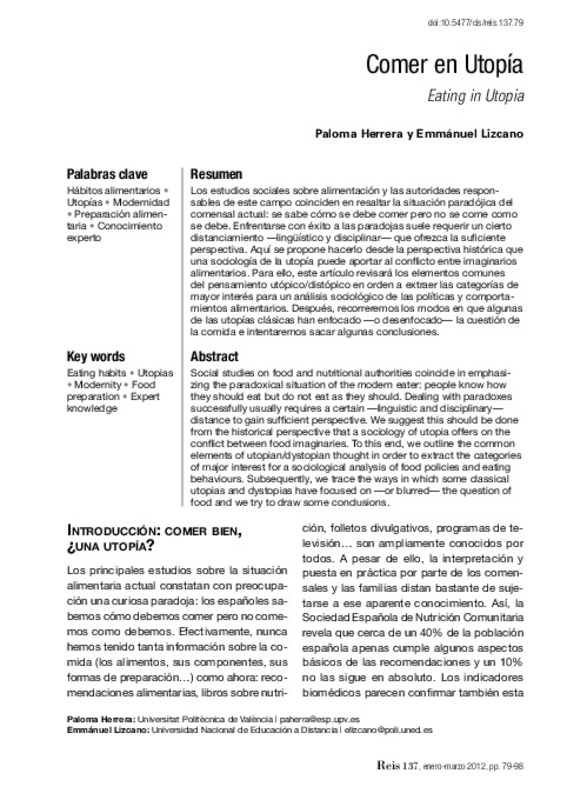JavaScript is disabled for your browser. Some features of this site may not work without it.
Buscar en RiuNet
Listar
Mi cuenta
Estadísticas
Ayuda RiuNet
Admin. UPV
Comer en Utopía
Mostrar el registro sencillo del ítem
Ficheros en el ítem
| dc.contributor.author | Herrera Racionero, Paloma
|
es_ES |
| dc.contributor.author | Lizcano, Emmanuel
|
es_ES |
| dc.date.accessioned | 2015-02-04T15:23:21Z | |
| dc.date.available | 2015-02-04T15:23:21Z | |
| dc.date.issued | 2012 | |
| dc.identifier.issn | 0210-5233 | |
| dc.identifier.uri | http://hdl.handle.net/10251/46747 | |
| dc.description | Reis 137, enero-marzo 2012, pp. 79-98 http://www.reis.cis.es/ | es_ES |
| dc.description.abstract | [EN] Social studies on food and nutritional authorities coincide in emphasizing the paradoxical situation of the modern eater: people know how they should eat but do not eat as they should. Dealing with paradoxes successfully usually requires a certain -linguistic and disciplinary- distance to gain sufficient perspective. We suggest this should be done from the historical perspective that a sociology of utopia offers on the conflict between food imaginaries. To this end, we outline the common elements of utopian/dystopian thought in order to extract the categories of major interest for a sociological analysis of food policies and eating behaviours. Subsequently, we trace the ways in which some classical utopias and dystopias have focused on-or blurred-the question of food and we try to draw some conclusions. | es_ES |
| dc.description.abstract | [ES] Los estudios sociales sobre alimentación y las autoridades responsables de este campo coinciden en resaltar la situación paradójica del comensal actual: se sabe cómo se debe comer pero no se come como se debe. Enfrentarse con éxito a las paradojas suele requerir un cierto distanciamiento —lingüístico y disciplinar— que ofrezca la sufi ciente perspectiva. Aquí se propone hacerlo desde la perspectiva histórica que una sociología de la utopía puede aportar al confl icto entre imaginarios alimentarios. Para ello, este artículo revisará los elementos comunes del pensamiento utópico/distópico en orden a extraer las categorías de mayor interés para un análisis sociológico de las políticas y comportamientos alimentarios. Después, recorreremos los modos en que algunas de las utopías clásicas han enfocado —o desenfocado— la cuestión de la comida e intentaremos sacar algunas conclusiones. | es_ES |
| dc.language | Español | es_ES |
| dc.publisher | Centro de Investigaciones Sociológicas | es_ES |
| dc.relation.ispartof | Revista Española de Investigaciones Sociológicas | es_ES |
| dc.rights | Reserva de todos los derechos | es_ES |
| dc.subject | Eating habits | es_ES |
| dc.subject | Utopias | es_ES |
| dc.subject | Modernity | es_ES |
| dc.subject | Food preparation | es_ES |
| dc.subject | Expert knowledge | es_ES |
| dc.subject | Hábitos alimentarios | es_ES |
| dc.subject | Utopías | es_ES |
| dc.subject | Modernidad | es_ES |
| dc.subject | Preparación alimentaria | es_ES |
| dc.subject | Conocimiento experto | es_ES |
| dc.subject.classification | ECONOMIA, SOCIOLOGIA Y POLITICA AGRARIA | es_ES |
| dc.title | Comer en Utopía | es_ES |
| dc.title.alternative | Eating in Utopia | es_ES |
| dc.type | Artículo | es_ES |
| dc.identifier.doi | 10.5477/cis/reis.137.79 | |
| dc.rights.accessRights | Abierto | es_ES |
| dc.contributor.affiliation | Universitat Politècnica de València. Departamento de Economía y Ciencias Sociales - Departament d'Economia i Ciències Socials | es_ES |
| dc.description.bibliographicCitation | Herrera Racionero, P.; Lizcano, E. (2012). Comer en Utopía. Revista Española de Investigaciones Sociológicas. (137):79-98. doi:10.5477/cis/reis.137.79 | es_ES |
| dc.description.accrualMethod | S | es_ES |
| dc.relation.publisherversion | http://dx.doi.org/10.5477/cis/reis.137.79 | es_ES |
| dc.description.upvformatpinicio | 79 | es_ES |
| dc.description.upvformatpfin | 98 | es_ES |
| dc.type.version | info:eu-repo/semantics/publishedVersion | es_ES |
| dc.description.issue | 137 | es_ES |
| dc.relation.senia | 213010 |








